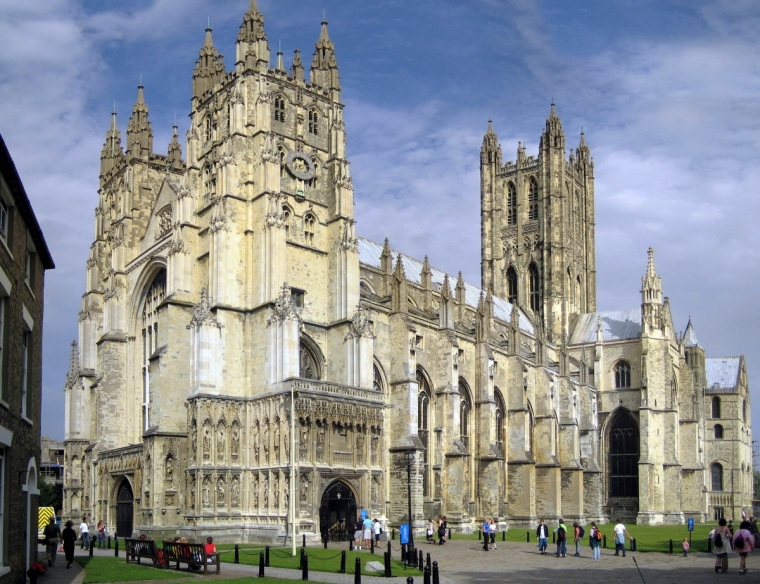People with 'no religion' now exceed Christians in England and Wales, study finds
A recent study revealed that the number of people who identify themselves as having no religion has exceeded the number of those who identify as Christians in England and Wales.
The study also found that people with no religion, otherwise known as "nones," increased to 48.5 percent of the population in 2014 from 25 percent in 2011, while people who identified as Anglican decreased from 44.5 percent in 1983 to only 19 percent in 2014. On the other hand, Christians comprised 43.8 percent of the population in 2014.

The Christians referred to in the study included Catholics, Anglicans and other denominations. The study involved data gathered through British Social Attitudes surveys, which had been collected for more than 30 years.
Study author Stephen Bullivant noted that there is a "clear sense of the growth" of the "nones." This indicated that those who were brought up in households that practiced some form of religion are now identifying themselves as having no religion, Bullivant added.
"What we're seeing is an acceleration in the numbers of people not only not practising their faith on a regular basis, but not even ticking the box," he said.
Bullivant attributed the findings to "the big question in the sociology of religion."
The study found that Catholic and Anglican churches are finding it difficult to retain church members who had a Christian upbringing. The survey results showed that four in 10 adults who were previously Anglicans have chosen to become "nones."
Bringing in new people has also been a problem for both Anglicans and Catholics. For Anglican churches, 12 members are lost for every new person brought in; while for Catholic churches, 10 members are lost for every new person in the church, according to the study.
Most of those who now identify as "nones" are from Christian denominations and not from families that did not practice any religion or non-Christian families.
"There's a kind of denominational musical chairs," said Bullivant. "No one is making serious inroads into the non-Christian population."
In 2014, the results of a Religious Landscape Study conducted by the Pew Research Center in the U.S. showed that the number of Christians in the U.S. population is decreasing. The trend could be observed across all religions, ages and backgrounds.
The survey, which was participated in by 35,000 American respondents, showed that the percentage of adults who identified as Christians decreased from 78.4 in 2007 to 70.6 in 2014. On the other hand, those who did not identify with any religion increased from 16.1 to 22.8 percent during the same time period.
 Christians don't have to affirm transgenderism, but they can’t express that view at work: tribunal
Christians don't have to affirm transgenderism, but they can’t express that view at work: tribunal Archaeology discovery: Medieval Christian prayer beads found on Holy Island
Archaeology discovery: Medieval Christian prayer beads found on Holy Island Presbyterian Church in America votes to leave National Association of Evangelicals
Presbyterian Church in America votes to leave National Association of Evangelicals Over 50 killed in 'vile and satanic' attack at Nigerian church on Pentecost Sunday
Over 50 killed in 'vile and satanic' attack at Nigerian church on Pentecost Sunday Ukrainian Orthodox Church severs ties with Moscow over Patriarch Kirill's support for Putin's war
Ukrainian Orthodox Church severs ties with Moscow over Patriarch Kirill's support for Putin's war Islamic State kills 20 Nigerian Christians as revenge for US airstrike
Islamic State kills 20 Nigerian Christians as revenge for US airstrike Man who served 33 years in prison for murder leads inmates to Christ
Man who served 33 years in prison for murder leads inmates to Christ


 Nigerian student beaten to death, body burned over ‘blasphemous’ WhatsApp message
Nigerian student beaten to death, body burned over ‘blasphemous’ WhatsApp message 'A new low': World reacts after Hong Kong arrests 90-year-old Cardinal Joseph Zen
'A new low': World reacts after Hong Kong arrests 90-year-old Cardinal Joseph Zen Iran sentences Christian man to 10 years in prison for hosting house church worship gathering
Iran sentences Christian man to 10 years in prison for hosting house church worship gathering French Guyana: Pastor shot dead, church set on fire after meeting delegation of Evangelicals
French Guyana: Pastor shot dead, church set on fire after meeting delegation of Evangelicals ‘Talking Jesus’ report finds only 6% of UK adults identify as practicing Christians
‘Talking Jesus’ report finds only 6% of UK adults identify as practicing Christians Mission Eurasia ministry center blown up in Ukraine, hundreds of Bibles destroyed: 'God will provide'
Mission Eurasia ministry center blown up in Ukraine, hundreds of Bibles destroyed: 'God will provide' Church holds service for first time after ISIS desecrated it 8 years ago
Church holds service for first time after ISIS desecrated it 8 years ago Burger King apologizes for 'offensive campaign' using Jesus' words at the Last Supper
Burger King apologizes for 'offensive campaign' using Jesus' words at the Last Supper Uganda: Muslims abduct teacher, burn him inside mosque for praying in Christ’s name
Uganda: Muslims abduct teacher, burn him inside mosque for praying in Christ’s name